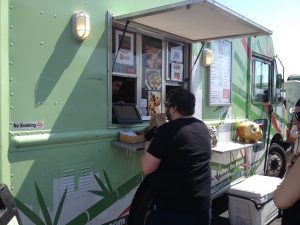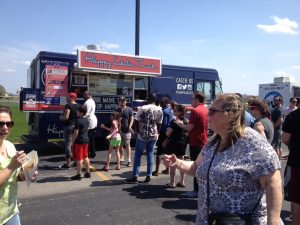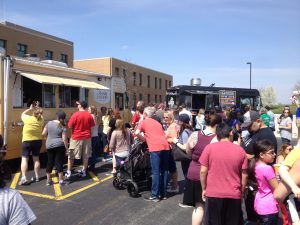Food truck season pulls into western suburbs
By Erika Wurst For Chronicle Media — May 3, 2017
Each city in the west suburban area has its own regulations for food truck operations. (Photo courtesy of James Jensen)
Food truck festival season is underway, and hungry folks from across the suburbs are lining-up for their favorite treats.
From lobster rolls to empanadas, shaved ice and toasty cheese sandwiches — there’s no shortage of variety to please the palate.
Last month, hundreds of people made it out to Oswego East High School’s second annual Food Truck Feast to indulge in the area’s finest food truck fare, and this Friday, they’ll assemble again in downtown Aurora to munch.
Nearly 20 different trucks or eateries will be on-hand to satisfy any craving during Aurora’s Food Truck Festival. The event takes place during the city’s First Friday’s celebration held from 5-10 p.m. downtown. Trucks will line up Benton Street from River Street to Water Street in conjunction with events happening at businesses throughout the area.
An East Aurora Food Truck Rally is also scheduled to take place Memorial Day weekend at Belle Salle Banquets in Aurora. On May 26, approximately 10 trucks will gather in the lot, accompanied by a DJ.
If the events are anything like Oswego’s most recent food truck festival, lines will be long, but the food worth the wait.
And, while these gatherings are great, don’t expect to see trucks parked on the corner of your favorite street serving lunch anytime soon.
In Naperville, the practice is prohibited. Trucks are welcome to park on private property, but the city of Naperville does not allow food trucks on city streets or parking lots.

The Food Truck Feast held at Oswego East H.S. on April 15 drew big interest. The event was an early kick off to the festival season in the region, which will bring more food tucks to west suburban streets. (Photo courtesy of James Jensen)
“They are only allowed on private property with the permission of the property owners and must have the required paperwork from the (DuPage or Will) county health department,” said City Clerk Lynn Zillinsky.
Zillinsky said no one has ever approached the city council about wanting to park in the downtown area.
“They generally go to industrial parks or breweries and I think that they do well enough on private property that they don’t need (the city ways),” she said. “There’s not enough parking for regular people downtown, to have a food truck park there would never fly.”
Elgin follows in line with Naperville’s thinking, according to Molly Center, communications Specialist for the city of Elgin
“Food trucks are only allowed on public streets or parking lots in conjunction with a city permitted event,” Center said.
Last August, about 3,000 people descended upon Elgin’s Festival Park for radio-show host Eric and Kathy’s Food Truck Festival. There were 18 trucks that took part in the permitted event.
Food trucks are also allowed on private property in Elgin, but for a short period of time, Center said.
In places like Wheaton and Oswego, food trucks are welcome along city streets, but rarely seen.
“From a suburban standpoint, it’s hard to get the density of people and traffic that a truck needs to succeed,” said Jim Kozik, director of Planning and Economic Development for the City of Wheaton.
Kozik acknowledged the obstacles faced by food truck vendors when they attempt to escape the festival circuit and venture out on their own.

Hundreds of people attended the Oswego East High School Food Truck Feast on April 15 at Oswego East High School. The festival is one of many to be held throughout the suburbs this season as food trucks gain popularity with food lovers and municipalities, alike. (Photo courtesy of James Jensen)
“A lot of times there are municipal regulations that make it difficult for food truck owners,” he said. “In DuPage County, the health department’s regulations are rigorous. The trucks are a big investment and they need to be somewhere where there are a lot of people in order to profit.”
In October 2016, the Oswego Village board voted 5-1 to allow food trucks to operate on their public property — but a number of restrictions and fines were put in place.
Trucks are not allowed on certain streets and in certain public areas throughout the village, and there is a 90-minute time limit on how long a truck can remain in a stationary location.
Despite the time regulation, Oswego Village trustee Joe West said in October when the ordinance passed that he felt it was unfair for a truck to pull-up next to a brick and mortar business and steal customers. His was the board’s only vote opposing the ordinance’s approval.
“It seems kind of unfair to the person that’s paying rent on that property to have the truck paying only $200 to be there,” he said.
Trucks operating on public property in Oswego must pay a $200 yearly licensing fee for their first vehicle and $100 for an additional truck. Trucks parked on private property must pay only $25.
County health departments also charge for licensing, which is required.
So, while you don’t see them often roaming city streets, you’re likely to run into a plethora of trucks parked together as festivals gain popularity and city approval.
“We haven’t had a festival yet that involved trucks,” Wheaton’s Kozik said. “It’s an idea that the Downtown Wheaton Association might explore in the future. I think it’s a great idea and will bring people in. It provides the density you don’t have if it’s just one or two trucks somewhere roaming downtown.”
— Food truck season pulls into western suburbs —



